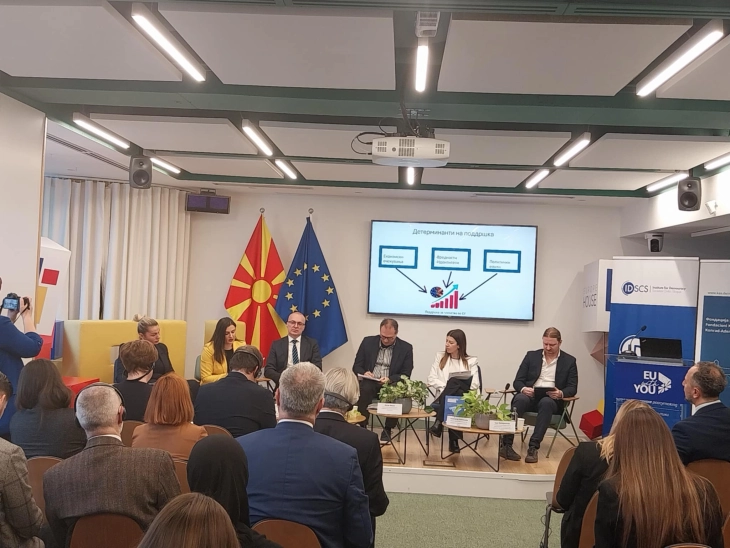Euroskepticism enemy of EU agenda, country should work on reforms
- Euroskepticism is the enemy of the country's EU agenda; diplomats need to be creative and no longer allow the issue to be politically divisive, according to panelists discussing Monday an opinion poll conducted between October and December 2024 on the nation's European integration process.

Skopje, 17 February 2025 (MIA) — Euroskepticism is the enemy of the country's EU agenda; diplomats need to be creative and no longer allow the issue to be politically divisive, according to panelists discussing Monday an opinion poll conducted between October and December 2024 on the nation's European integration process.
At the panel organized by the Institute for Democracy Societas Civilis Skopje, Deputy Minister of European Affairs Viktorija Trajkov said state institutions should all focus and work together on implementing reforms, while being transparent and open to citizens.
"We have to be aware Euroskepticism is the enemy of our agenda and we have to show citizens that we are making the right decisions," Trajkov said.
"We have to aim together for internal reforms. Our reform agenda package has been evaluated as the best of all the countries' in the region," she noted.

According to the deputy minister of European affairs, young people were not interested in historical problems as much as in the country's cultural and economic progress.
National European Integration Council member and MP Monika Zajkova in her remarks said it was encouraging that 62 percent of respondents supported the state's EU membership aspirations.
"Although some Euroskepticism remains, I'm glad the percentage of it is a small 11 percent, which suggests that our society still sees the EU as our only partner," Zajkova said.
"We need to be creative diplomats to achieve concrete progress," she said, adding that survey results clearly showed that parties' narratives influenced public sentiment regarding the EU.
"I call on both the left and the right to build common positions, to lobby for those positions abroad, and to no longer allow this issue to divide them or citizens along party lines," Zajkova said.

Addressing the panel, Deputy Parliament Speaker and Committee on European Affairs chair Antonijo Miloshoski said the EU would be stronger and more influential if it integrated the Western Balkans.
"I believe the EU's decision-making process is quite complicated, and the process of making strategic decisions is not out of that context of complications," Miloshoski said.
"By including the Western Balkan countries, the EU would be both economically stronger and politically more influential," he added.
According to public opinion survey done by the Institute for Democracy Societas Civilis Skopje in cooperation with the Konrad Adenauer Foundation, 62 percent of respondents support the country's accession to the European Union. Public perception of the influence of the USA has declined by 20 percent compared to last year, the poll showed. mr/







